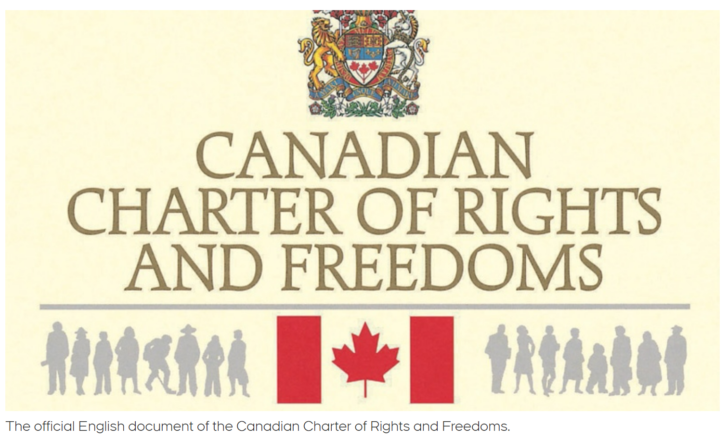This post is also available in: 简体中文 繁體中文
Various vaccine mandates have been in place across Canada for months, requiring proof of COVID-19 vaccination to access non-essential businesses, attend certain events or board planes and trains, for example.
The mandates have faced opposition from Canadians who say they are concerned their rights and freedoms are being infringed upon.
One of the most commonly referenced arguments against vaccine mandates is that they violate the Canadian Charter of Rights and Freedoms, or, more specifically, Section 7 of the charter, which reads:
“Everyone has the right to life, liberty and security of the person and the right not to be deprived thereof except in accordance with the principles of fundamental justice.”

But, according to constitutional law experts, these claims are not exactly true. While vaccine mandates may have an impact on charter rights, whether it is an illegal infringement on those rights is unlikely when looking at specific case law.
ANALYSIS
Before we dive into the fine print, it’s important to note that both of our experts agree nothing is certain in the law. Certainly, if someone wanted to challenge the government over the charter, they could. But they say successfully arguing such a case is very unlikely.
As Cheryl Milne, executive director of the David Asper Centre for Constitutional Rights at the University of Toronto explains, a charter argument may apply under Section 15, which discusses equality, for someone with a disability who cannot get vaccinated. Or under Section 2, which deals with freedom of religion and expression.
But Milne points out there are very few circumstances in which people cannot be vaccinated and have sound proof of that.
Vaccine mandates are not “forced vaccination”
Would-be claimants would face multiple hurdles to prove their case. The first would involve establishing an infringement of a protected interest in “life, liberty or security of the person.”
But, contrary to claims otherwise, vaccine mandates do not constitute forced vaccination.
“There are some people who think that vaccine passports and the use of the word ‘mandate’ means that we’re holding people down and forcing them to be vaccinated,” Milne told CTVNews.ca by phone this week.
“It’s just limiting the ability to participate in certain activities if they don’t have a vaccine. If, in fact, the government were forcing people to be vaccinated – like actually physically holding people down and giving them a vaccine – that would probably be a pretty clear charter breach.”
Mandates offer a choice: receive or decline the vaccine. Those who decline are instead presented with a different set of options.
“In the case of students, you can try to enroll in online classes, or you can take a term off. In the case of employees, you can try to seek accommodation or take a leave,” Samuel E. Trosow, associate professor in the faculty of law and faculty of information and media studies at Western University, told CTVNews.ca by phone.
“These may be inconvenient and unwanted options, but they are options.”
Even if a claimant were to make out that there has been a violation of the liberty interest or security of person interest, they would also have to prove that the infringement was under circumstances that violated principles of fundamental justice. In other words, the mandate is arbitrary, overly broad or grossly disproportionate.
Because vaccine mandates seek to protect the health and safety of the public, citing evidence that vaccines reduce the severity of illness and can reduce transmission, in cases where lockdowns, masking, social distancing and testing cannot, Trosow says it would be hard to argue any of those points.
“When you really look at the case law, and really understand what the specific requirements are, the argument falls apart,” he says.
‘Subject to reasonable limits’
Even if a claimant were to establish a violation of Section 7, the violation could be upheld under Section 1 of the charter.
“Section 1 of the charter says ‘all of the rights and freedoms in the charter are subject to such reasonable limits as can be demonstrably justified in a free and democratic society,’” explained Milne.
“What that means is that there is this kind of proportional, reasonable approach that governments can actually limit people’s rights so long as they have a very good reason and can demonstrate why. A global pandemic might just be one of those reasons.
[But] they can only go so far as what is minimally impairing of the right. Stopping people from going to a restaurant might be considered minimally impairing when the consequences are further spread of a highly contagious virus.”
For example, in September 2020, Halifax resident Kimberly Taylor sued the Newfoundland and Labrador government after she was initially denied an exemption to the province’s travel ban after her mother’s death.
Taylor argued that the province overstepped its authority and violated her constitutional rights. But a Supreme Court judge ruled that the infringement was justified because of the COVID-19 pandemic.
CONCLUSION
Although vaccine mandates may have an impact on charter rights, whether it is an illegal infringement on those rights is unlikely.
“If someone says, ‘vaccine passports are a breach of charter rights’ – full stop, without the nuance – I would say it’s misleading,” said Milne.
“They would have to say they don’t think it would withstand the test of Section 1, it’s not reasonable. And I’m on the side that it’s probably reasonable, but people can differ about that.”
As Trosow points out, “while nothing is certain in the law – there are always perils of litigation – all of the good jurisprudence points to the conclusion that a Section 7 claim would not be actionable.
To make up spurious legal claims as an excuse [not to get vaccinated] I find very questionable.”
Article From: CTV NEWS
Author: Nicole Bogart

